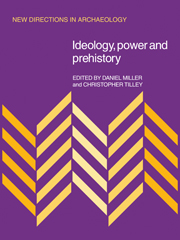1 - Ideology, power and prehistory: An introduction
Published online by Cambridge University Press: 05 March 2012
Summary
This volume is first shown to form part of a larger dialogue arising from some critiques of the dominant models in archaeological theory. In particular, it is part of an attempt to credit people and society in prehistory and material culture studies with the same abilities as we credit ourselves, rather than reducing them to the passive recipients of external forces. Two general discussions then follow, a summary is given of some approaches to the concept of power, and in particular a description and critique of Foucault's recent work on this topic is used as the basis for developing a working model of power. A model for the critique of ideology is developed through the examination of three examples. Firstly Marx's critique of the bourgeois conception of the political economy, secondly Marx's own labour theory of value, and thirdly the implications of three recent critiques of Marx's work. From these are derived some general characteristics of a working model for the critique of ideology, which differs in a number of respects from the original example of Marx's writings.
A problem in archaeology has always been that its method has provided the dominant metaphor for its interpretation. Before all else, archaeology has been about discovery. It is as quest and search that archaeology first commanded and now continues to fascinate its wide audience. This is encapsulated in the image of the archaeologist finally clearing a way through the last of the jungle to reveal the ancient ruined city, or burrowing through placid fields and orchards to uncover the unsuspected evidence of antiquity.
- Type
- Chapter
- Information
- Ideology, Power and Prehistory , pp. 1 - 16Publisher: Cambridge University PressPrint publication year: 1984
- 38
- Cited by



